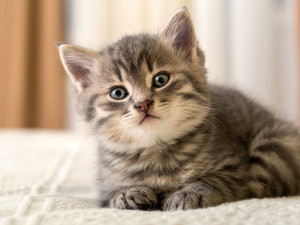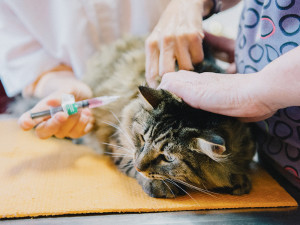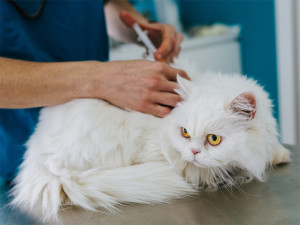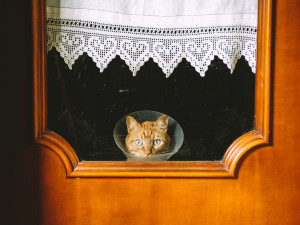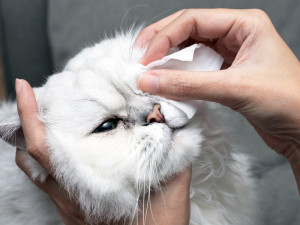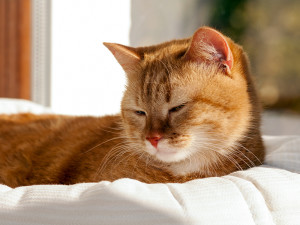Can Cats Get Parvo? The Symptoms, Treatment, and Dangers
Learn about “feline parvovirus” and the symptoms you should watch for.
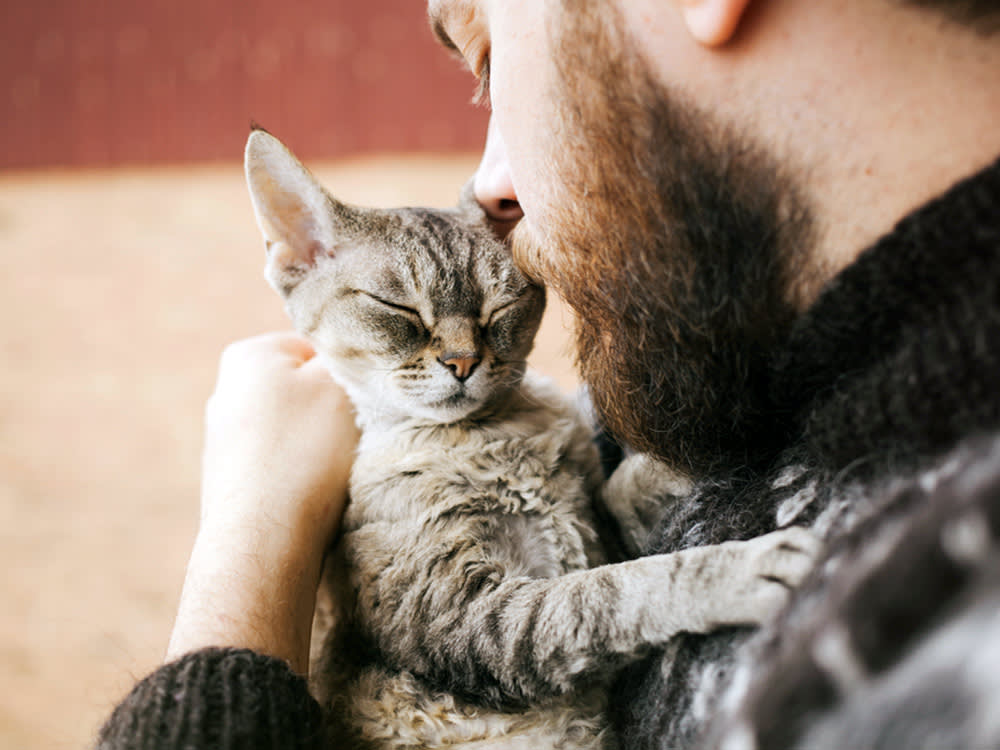
Share Article
In This Article:
Can Cats Get Parvo From Dogs? What Is Feline Panleukopenia Virus? Treatment Options for Parvo In Cats Are Certain Cats More at Risk? Prevention Tips for Feline Parvo
You might hear about parvovirus or “parvo” in connection to dogs, but cats can get their own form of this illness. Regular vaccines can protect cats against potentially fatal infections, including feline panleukopenia virus (FPV). Most common in kittens, feline panleukopenia virus (sometimes referred to as “feline parvovirus”) can cause gastrointestinal symptoms, severe dehydration and dangerous immune system suppression in our kitty companions.
Here’s everything you need to know about how to keep your feline family members safe from this serious virus.
Can cats get parvo from dogs?
Again, parvo, specifically canine parvovirus, is a disease typically associated with dogs only. Cats can contract a similar virus called feline panleukopenia virus (FPV), which causes symptoms very similar to that of canine parvovirus, including vomiting, diarrhea, severe dehydration, weakness, and death if left untreated.

What is feline panleukopenia virus (FPV)?
Feline panleukopenia, sometimes referred to as “feline parvovirus” is a highly contagious, potentially life-threatening infection causing a decrease in white blood cells (leukocytes) and a weakened immune system in cats. This virus infects and destroys rapidly growing cells, such as those in the gastrointestinal tract, oftentimes causing vomiting, diarrhea, severe dehydration, weakness, and death if left untreated. This virus is similar to canine parvovirus, but is not caused by the same organism.
Symptoms of feline panleukopenia virus
Most common symptoms of FPV include vomiting, diarrhea, dangerous dehydration, weakness and death if left untreated.
Severity of feline panleukopenia virus
Feline panleukopenia virus can be severe and even fatal if left untreated. Early diagnosis and treatment can improve outcomes and prevent more serious illness. Kittens are most susceptible to FPV, and infections tend to be more serious in this cohort of cats. If your cat or kitten are not vaccinated and are showing signs of vomiting, diarrhea, decreased appetite or weakness, it is important to have your cat seen by a veterinarian ASAP.
What are the treatment options for parvo in cats?
Although there is not one specific treatment for feline panleukopenia, treatment is primarily focused on supportive care and managing symptoms associated with the virus. Severely affected cats may require hospitalization and intensive intravenous (IV) fluid therapy to correct dehydration due to fluid loss from vomiting and diarrhea, manage electrolyte imbalances, treat vomiting and nausea, and nutritional support, sometimes with a feeding tube until infected cats are eating on their own.
Antibiotics are oftentimes prescribed to treat or prevent a secondary bacterial infection. If diagnosed and treated early, some cats may be able to treated on an outpatient basis. This typically depends on if symptoms can be managed with oral medications alone, and if the cat is eating and drinking at home. It is important to note that cats infected with panleukopenia virus are highly contagious and should be isolated from other cats.
Are certain cats more at risk than others?
In general, unvaccinated cats are more at risk than vaccinated cats. Kittens who are not yet old enough to start their vaccines, or have not yet completed their initial vaccine booster series are particularly at higher risk, especially since their immune system is not yet fully competent/developed.
What are some prevention tips for feline parvo?
Although feline panleukopenia virus is a serious infection, luckily, it can be prevented with a safe and effective vaccine. The feline panleukopenia virus vaccine is typically administered in a combination vaccine, and is considered a core vaccine for all kittens. Kittens can be vaccinated as early as six weeks of age, and should receive a booster every three to four weeks until they are over 16 weeks old.
In general, due to the serious nature of the infection, if a kitten’s vaccine history is unknown or unclear, veterinarians will typically err on the side of caution and vaccinate since the benefit far outweighs the risk of a potentially extra vaccine booster. Additionally, isolating kittens and cats from known positive cases, or from unvaccinated kittens that have not yet been tested is crucial at controlling the spread of infection.
Decontaminating the environment where infected cats or kittens have been will prevent the spread of the virus to other cats. FPV can persist in the environment for extended periods of time. Removing organic matter and debris, and cleaning with a bleach-based solution is recommended for disinfecting surfaces that infected cats have come in contact with. Allowing the solution to soak for 10 to 15 minutes before rinsing is recommended.

Dr. Gabrielle Fadl, DVM
After graduating from Kansas State University College of Veterinary Medicine, Dr. Fadl returned to the New York area to pursue a one-year rotating internship and has been working in general practice since. Dr. Fadl loves working in the pet space to foster the powerful human-animal bond. She hopes to continually learn and grow to practice the best quality medicine. Her motto is “Keep calm and try to take it as it comes.”
Related articles
![cat getting a vaccine at the vet]()
Yep, Kittens Need Vaccines (Even Indoor Ones)
A vet gets the facts straight.
![Young person veterinarian in their veterinary clinic performing a medical examination on a pet.]()
What to Know About Rabies in Cats
There is one way to make sure your cat stays safe: vaccinate, vaccinate, vaccinate.
![cat with cone after vet visit]()
How Often Should You Take Your Cat to the Vet?
Get thy cat to a vet, even if it’s a struggle to get them out the door.
Can Cats Get Pink Eye? The Signs, Symptoms, and Treatments
The answer isn’t cute, but here’s how to help your kitty.
![cat getting a vaccine at the vet]()
Yep, Kittens Need Vaccines (Even Indoor Ones)
A vet gets the facts straight.
![Red cat with squinted eyes laying in a basket closeup]()
6 Ways Your Cat Could Tell You They Are in Pain
Here are all the way your kitty is trying to tell you they’re hurting.


